Sorry Has Been the Hardest Word for Governments
CBC News,
http://cbc.ca/beta/news/cbc-news-online-news-staff-list-1.1294364
Canada’s next official apology is already in the works.
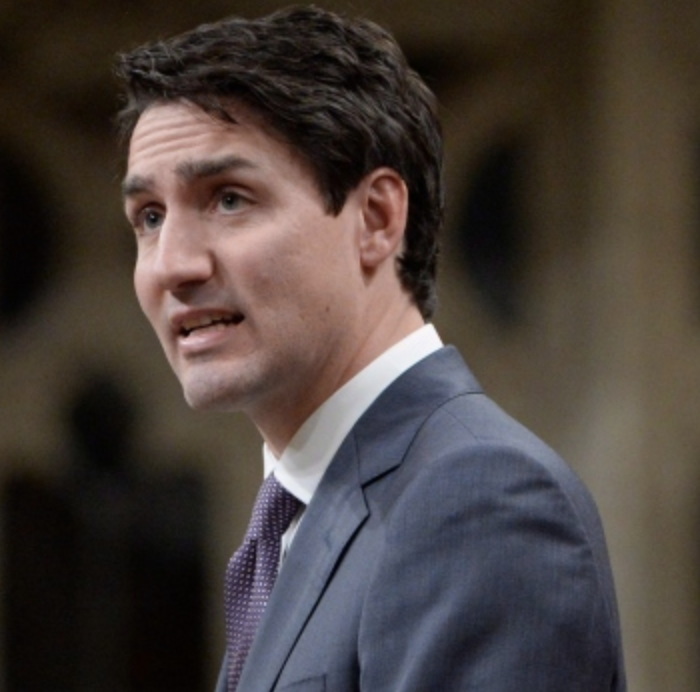
Prime Minister Justin Trudeau makes a formal apology to individuals harmed by federal legislation, policies, and practices that led to the oppression of and discrimination against LGBT people in Canada, in the House of Commons in Ottawa, on Tuesday. (Adrian Wyld/The Canadian Press)
The country, through its prime minister, is expected to express contrition for the historic cruelty of turning away of the St. Louis, a ship carrying Jewish refugees fleeing Nazism in 1939. [That tragedy was memorialized in the book and movie, Ship of Fools.]
The passengers had already been refused entry by Cuban and U.S. authorities. Rejected and dejected, they would return to a Europe on the brink of war. Many would die in Nazi concentration camps.
A statement of regret, 80 years after the fact, will fit firmly into the Canadian government’s record of official apologies.
Until Tuesday’s LGBTQ2 apology — and leaving aside apologies to individuals such as Maher Arar — Canada had atoned for three types of wrongs: those related to the Indian Residential School system, wrongs related to immigration, such as the Chinese head tax or the Komagata Maru incident, and wrongs it perpetrated during the two world wars, such as the internment of Japanese-Canadians and the executions of Canadian soldiers during the First World War.
The St. Louis incident checks two of those three boxes.
Some in the Jewish community have fought for years to make the government acknowledge that its decision was heartless and tainted by anti-Semitism.
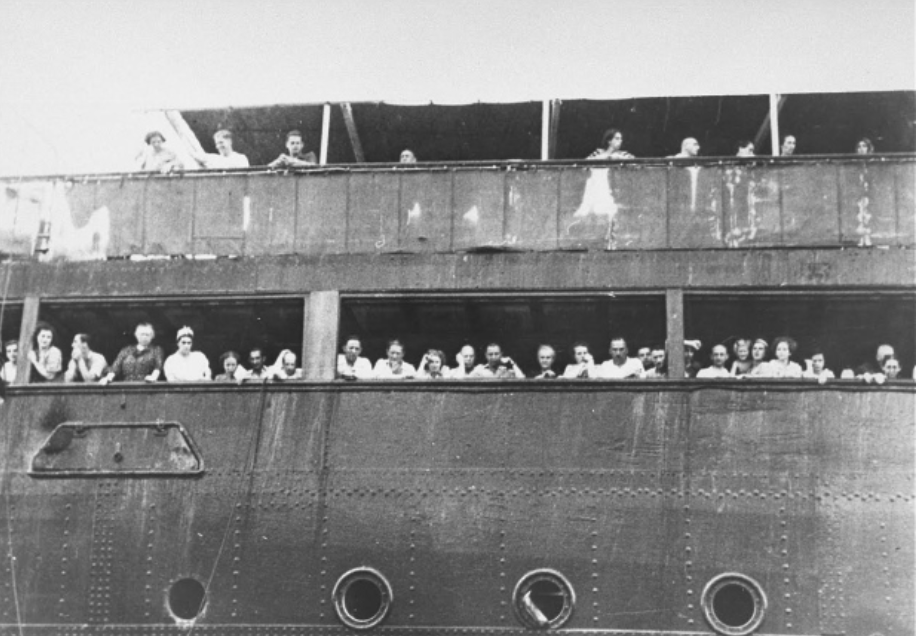
Jewish refugees aboard the MS St. Louis attempt to communicate with friends and relatives in Cuba, June 3, 1939. The ship’s passengers were later refused entry to Canada and many died in the Holocaust. (United States Holocaust Memorial Museum/National Archives and Records)
Others are less keen. Sally Zerker, whose Polish-Jewish family members on the St. Louis were turned away, wrote in Canadian Jewish News that an apology now would be “nothing but a shallow, empty, meaningless act.”
“It will not bring back my relatives, or offer me any solace. Instead, it will whitewash a government that did nothing to help the Jews who were fleeing the Nazis and ignored the type of anti-Semitism that was endemic in Canada until the 1970s.”
But Zerker’s reaction is not typical. Though panned by some critics as “virtue-signalling” and gesture politics, apologies often mean a lot to the people to whom they’re directed.
At least two other Canadian historical wrongs have already received tokens of official recognition, but no formal federal apology: the internment of Ukrainians during the First World War, and the racist discrimination endured by the black Nova Scotian community of Africville.
Both could be on the path that leads to a formal apology.
Apologies, left and right
It was Conservative Brian Mulroney who broke the ice in 1988, when he apologized for the internment of Japanese-Canadians (Ronald Reagan the same year signed a similar apology to Japanese-Americans who were interned). Stephen Harper followed suit in 2006 with an apology for the head tax that unfairly penalized Chinese immigrants from 1885 to 1923.
Harper also made what is probably Canada’s biggest apology to date for the residential school system. Justin Trudeau’s apology last week extended that apology to residential school survivors in Newfoundland and Labrador who had been excluded.
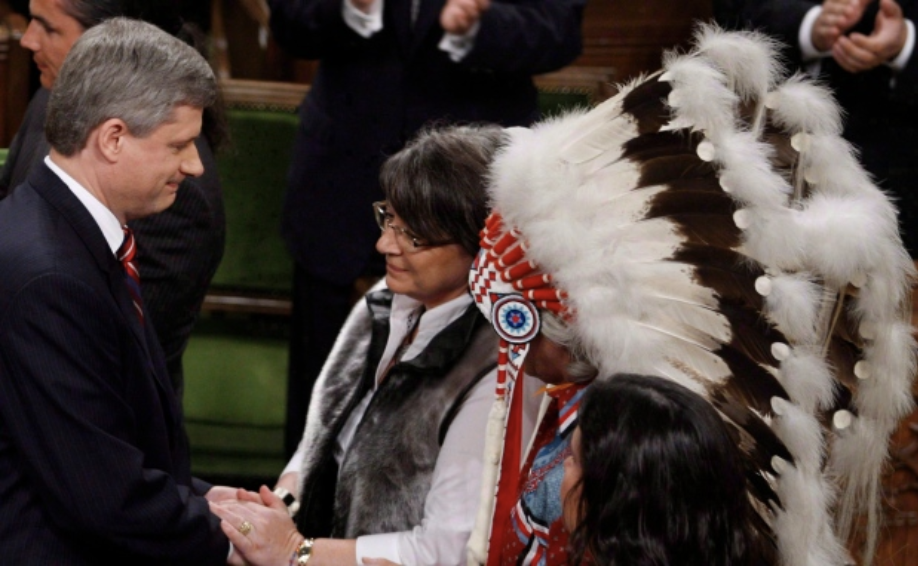
Then prime minister Stephen Harper shakes hands with Indigenous leaders on June 11, 2008, the day he formally apologized on behalf of the Canadian government for the residential school system. The exclusion of schools in Newfoundland and Labrador led to another apology by Justin Trudeau last week. (Fred Chartrand/Canadian Press)
Trudeau’s own father was no fan of saying sorry. When Mulroney first proposed an apology for Japanese-Canadians in 1984, Trudeau rebuffed him.
“I do not think it is the purpose of a government to right the past,” Pierre Trudeau said. “It is our purpose to be just in our time.”
“My father might have a different perspective on it than I do,” Justin Trudeau said Monday, as he prepared to apologize for the persecution of LGBT Canadians.
“He came at it as an academic, as a constitutionalist. I come at it as a teacher, as someone who’s worked a lot in communities.”
‘He Broke the Values We Had’:
Innu Women at Quebec MMIWG Hearing
Recount Priest’s Alleged Abuse
By Julia Page, CBC News Posted: Nov 29, 2017
http://www.cbc.ca/news/canada/montreal/indigenous-mmiwg-inquiry-abuse-1.4424087
Belgian missionary, Alexis Joveneau, worked in remote Innu communities on St. Lawrence coast for decades.
Women from Innu communities all along the north shore of the St. Lawrence River shared long-buried childhood memories Wednesday of being sexually abused by a once-lauded Catholic priest who worked in their territory for four decades, until his death in 1992.
That testimony came on the third day of Quebec hearings of the national inquiry into missing and murdered Indigenous women (MMIWG), taking place in Mani-Utenam, Que., near near Sept-Îles, 900 kilometres northeast of Montreal.
Father Alexis Joveneau arrived in Quebec from Belgium in the early 1950s. He worked in several remote Innu communities for four decades and died in Unaman Shipu, better known as La Romaine, in 1992.
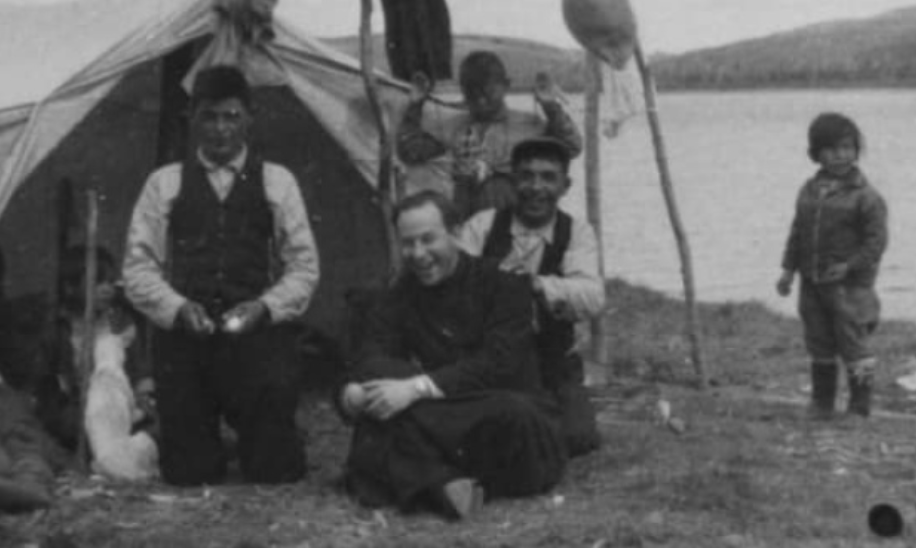
Alexis Joveneau was an Oblate priest who spent decades living among the Innu. The subject of a 1977 NFB documentary, he was long considered ‘a god,’ according to the testimony of Thérèse Lalo, a witness at the MMIWG inquiry. Several women have testified he sexually abused them as children and teens. Joveneau died in 1992. (Bibliothèque et Archives nationales du Québec)
The dam broke on Tuesday, when Innu elder Mary Mark described to the commissioners how Joveneau used to ask her to sit on his lap and start touching her chest when she went to confession.
“I am sure I wasn’t the only one to live that kind of thing — there were others,” said Mark, from the community of Pakua Shipu near the Labrador border.
Families and survivors share stories, denounce lack of government support at MMIWG hearings
60 years after Innu trapper’s disappearance, family members seek closure
Thérèse Lalo also testified about alleged abuse by Joveneau, saying she never spoke about what she went through until the preliminary hearings of the inquiry visited Pakua Shipu in September.
“I could not talk about it. He was like a god.”
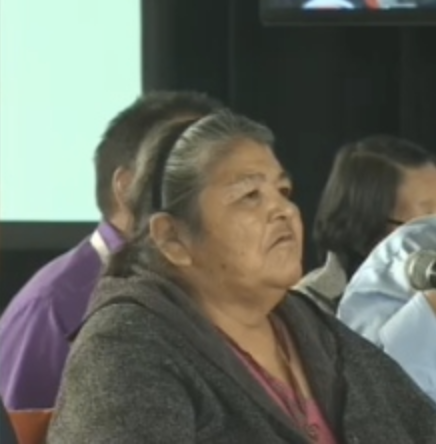
Simone Bellefleur testified she met a Belgian priest named Alexis Joveneau in Unamen Shipu and he sexually abused her from the age of 10 until she married at 19. (CBC)
She said he was feared in the community because he had moral authority, but was also admired and charismatic.
On Wednesday, Simone Bellefleur from Unamen Shipu, 460 kilometres east of Sept-Îles, told commissioners that Alexis Joveneau started abusing her when she was about 10 and didn’t stop until she married at 19.
“Normally, when we go to confession, we kneel down, but he’d ask us to sit on his lap,” Bellefleur told the inquiry.
“He was behind me, he started touching my breasts and went down towards my hips.”
“Often he’d invite us to do the dishes in his home, to do the same things. Sometimes he’d take us one after the other,” said Bellefleur.
Painful memories
Noella Mark, also from Unamen Shipu, said hearing other women’s testimony about Joveneau on Tuesday took her decades into the past.
“It was almost like he was in the room, that he was here,” said Mark.
“I hated that smell — his breath. I smell it now.”
Mark said the abuse started when she was seven and continued until she was 15 or 16.
“I went through the same thing, sat on the priest’s lap, he would stick his tongue in my ear.”
Mark said it took her a long time to understand the impact this abuse had on her spirit and said she was filled with anger for a long time.
“I understand abusers now, where it comes from, why they abuse others.”
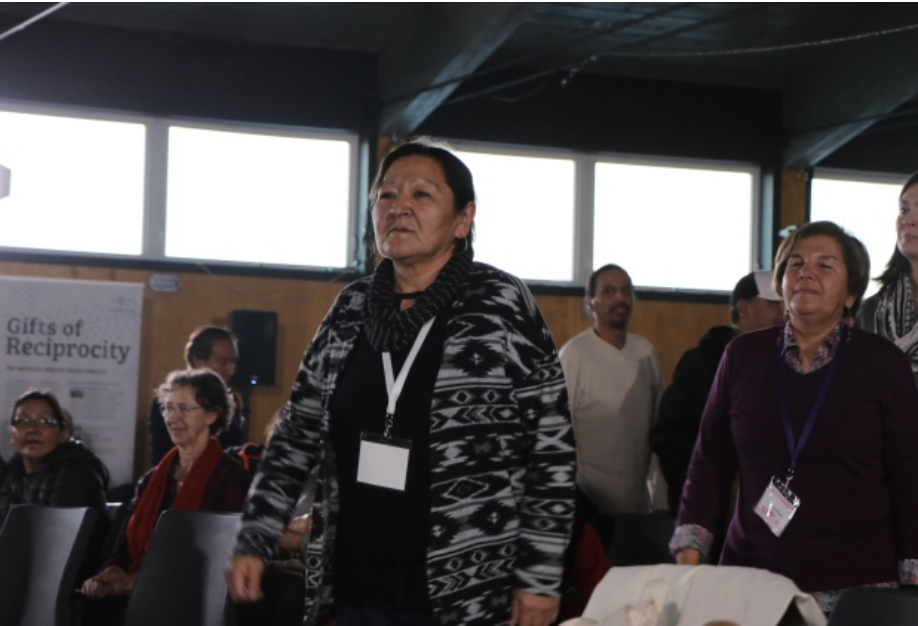
Noella Mark, from Unamen Shipu, Que., participates in a traditional Makusham dance, after sharing her memories of childhood abuse by a once-respected Catholic priest with commissioners at the MMIWG inquiry on Wednesday. (Julia Page/CBC)
Priest wielded power
Both women and men who spoke during the hearings described the power Joveneau had over the Innu communities where he worked.
Noella Mark said she never talked about the abuse because “he was considered to be the chief of the village, the head.”
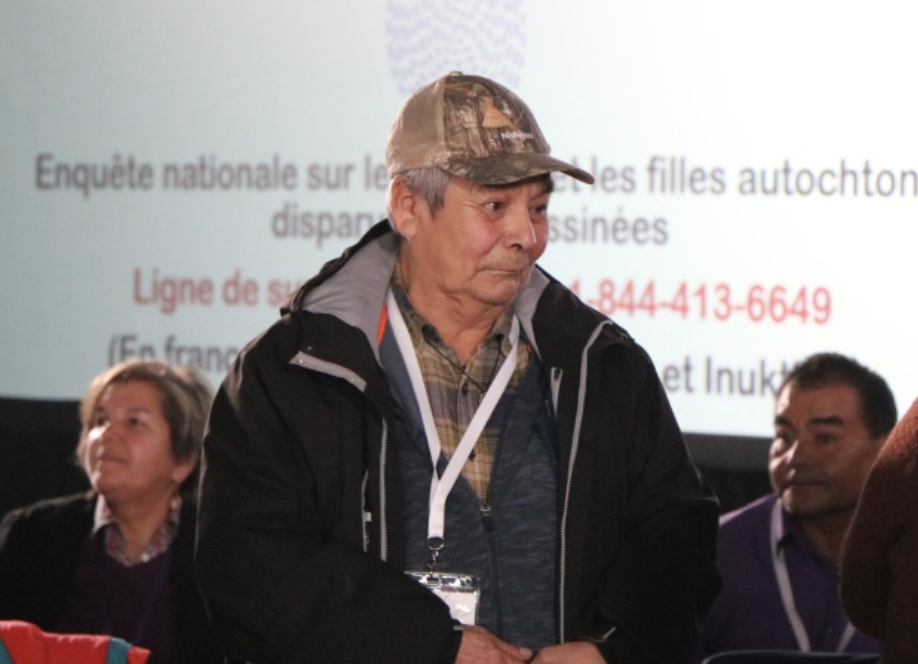
Ambroise Mark said the forced displacement of his family to Unamen Shipu, Que. in the 1960s should be compensated. (Julia Page/CBC)
Joveneau was also instrumental in the forced displacement of several families from Pakua Shipu to Unamen Shipu in the 1960s, more than 175 kilometres away.
Ambroise Mark remembered making the trip with Joveneau as a child, arriving in a desolate town with no amenities to house the new families.
Several decided to return to Pakua Shipu after seeing the dismal living conditions on the new reserve.
Mark said Joveneau punished them, trying to force them out.
“I remember being told there were shipments that never made it to the families, and he tore up cheques for the people of Pakua Shipu,” Mark said.
Deep scars in the community
Simone Bellefleur said today, she rarely crosses the threshold of a church, except for weddings or funerals.
“The priest showed us how to fight amongst ourselves. He broke the values we had. He broke us that way,” she said.
Bellefleur admitted the anger she carried since her childhood was sometimes taken out on her children.
It is only recently that she’s managed to heal, she said, along with her husband who she said was also physically abused by Joveneau.
Noella Mark said she, too, has healed only after undergoing therapy.
“That helped me when I told [my father], now no one will touch my body,” Mark said. “Now I love my body.”
She said Unaman Shipu is shattered, however, and drug and alcohol abuse is rampant.
“We are experiencing lots of problems. We don’t know where to turn to get help.”
Oblates offer ‘full collaboration’
Joveneau was a member of the Missionary Oblates of Mary Immaculate (OMI), a congregation founded in France in the early 1800s which sent its first missionaries to Canada in the 19th century.
“The Oblate Fathers are deeply concerned following the testimonies heard during this inquiry and hope light can be shed on these events,” the congregation said in a statement, after the first allegations against Joveneau were raised at the inquiry on Tuesday.
“The Oblate Fathers fiercely hope that the members of the community can testify openly to find peace. We condemn any form of physical or psychological violence.”
The inquiry’s hearings began in Whitehorse in May, and proceedings have taken place in British Columbia, Manitoba, Nova Scotia, Alberta and Saskatchewan so far. Hearings are scheduled for Thunder Bay, Ont., and Ranklin Inlet, Nunavut, next month, and for Yellowknife in the new year.
The planned stop in Rankin Inlet in December has postponed, and will now be held in January, CBC News has learned.
Elizabeth May Takes On ‘Cynics’ Who Might Think Canada Has Apologized Enough
By Ryan Maloney, Senior Politics Editor, HuffPost Canada
Green Party Leader Elizabeth May has a message for Canadian “cynics” who might feel their government has been saying sorry a bit too much lately.
The apologies matter, she told the House of Commons Tuesday. And not just to the people who feel them most closely.
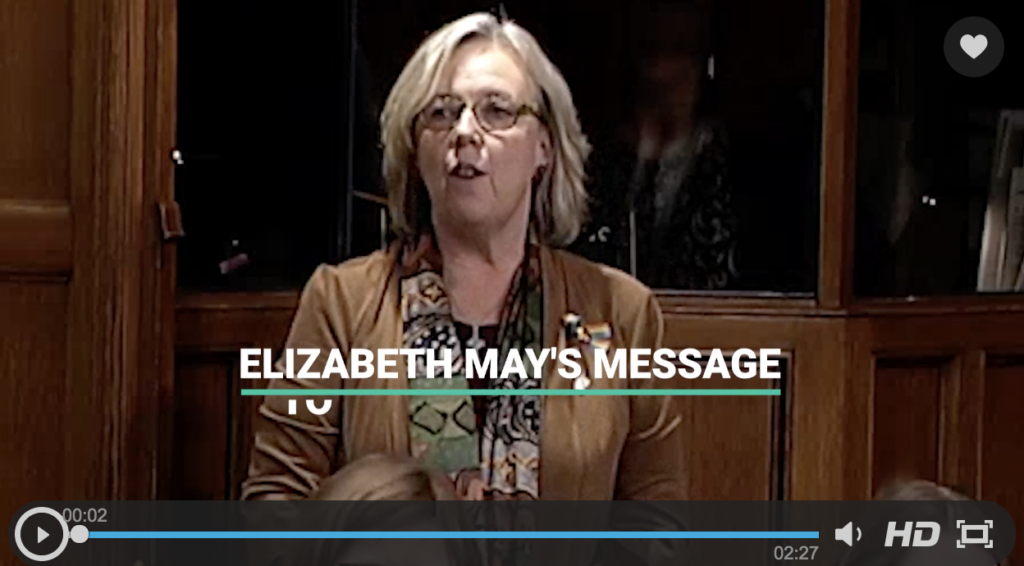
Click here to see Elizabeth May’s speech. . .
‘Extraordinary Jurist’: Sheilah Martin Named New Justice to the Supreme Court of Canada
By Kathleen Harris, CBC News Posted: Nov 29, 2017
http://www.cbc.ca/news/politics/supreme-court-justice-sheilah-martin-1.4424318
Prime Minister Justin Trudeau has nominated Alberta-based judge, author and academic Sheilah Martin to the Supreme Court of Canada.

Justice Sheilah Martin is shown in a handout photo supplied by the Alberta Courts. Prime Minister Justin Trudeau has appointed Alberta-based judge Martin to the Supreme Court of Canada. (Alberta Courts/Canadian Press)
Martin was first appointed as a judge in 2005, and served on the Court of Queen’s Bench of Alberta in Calgary until June 2016, when she was appointed as a judge of the Courts of Appeal of Alberta, the Northwest Territories and Nunavut.
She has also served as a deputy judge for the Supreme Court of Yukon since 2009.
Her 30-year legal career has focused on Indigenous issues, education, equality rights and increasing the number of historically underrepresented groups in law schools and the legal profession.
A news release from the Prime Minister’s Office also touted her awards, including the Distinguished Service Award for Legal Scholarship, the Law Society of Alberta’s Certificate of Merit and the YWCA’s Advancement of Women Award.
Trudeau praised Martin’s accomplishments as an asset to the top court.
“She has a breadth of experience, is an extraordinary jurist and has experience right across the country, including in the North,” he said. “She’s going to be a great voice on the Supreme Court.”
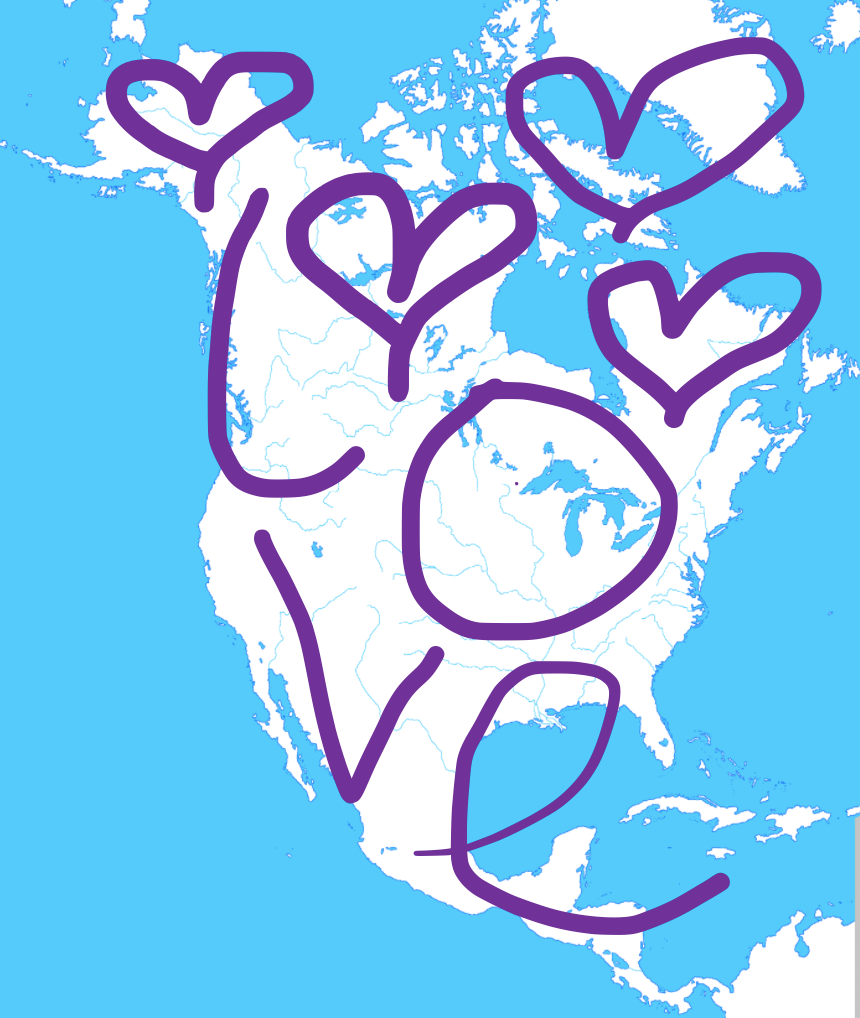
Love written with St. Germaine’s Violet Flame Torch
I invoke Sanat Kumara,
all Universal Law,
all blessings and virtues,
the seventh dimension of Love
for the apologies where necessary,
for forgiveness, for balance on Gaia.

